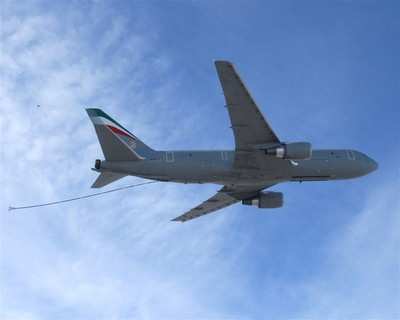Agency Recommends Air Force Reopen the Bid Process
 ANN REALTIME
REPORTING 06.18.08 1500 EDT: Whoa boy. The Government
Accountability Office (GAO) has just sustained the Boeing
Company’s protest of the Department of the Air Force’s
award of a contract to Northrop Grumman Systems Corporation for
KC-X aerial refueling tankers. Boeing challenged the Air
Force’s technical and cost evaluations, conduct of
discussions, and source selection decision.
ANN REALTIME
REPORTING 06.18.08 1500 EDT: Whoa boy. The Government
Accountability Office (GAO) has just sustained the Boeing
Company’s protest of the Department of the Air Force’s
award of a contract to Northrop Grumman Systems Corporation for
KC-X aerial refueling tankers. Boeing challenged the Air
Force’s technical and cost evaluations, conduct of
discussions, and source selection decision.
“Our review of the record led us to conclude that the Air
Force had made a number of significant errors that could have
affected the outcome of what was a close competition between Boeing
and Northrop Grumman. We therefore sustained Boeing’s
protest,” said Michael R. Golden, the GAO’s managing
associate general counsel for procurement law. “We also
denied a number of Boeing’s challenges to the award to
Northrop Grumman, because we found that the record did not provide
us with a basis to conclude that the agency had violated the legal
requirements with respect to those challenges.”

The GAO recommended that the Air Force reopen discussions with
the offerors, obtain revised proposals, re-evaluate the revised
proposals, and make a new source selection decision, consistent
with the GAO’s decision. The agency also made a number of
other recommendations including that, if the Air Force believed
that the solicitation, as reasonably interpreted, does not
adequately state its needs, the Air Force should amend the
solicitation prior to conducting further discussions with the
offerors; that if Boeing’s proposal is ultimately selected
for award, the Air Force should terminate the contract awarded to
Northrop Grumman; and that the Air Force reimburse Boeing the costs
of filing and pursuing the protest, including reasonable
attorneys’ fees. By statute, the Air Force is given 60 days
to inform the GAO of the Air Force’s actions in response to
GAO’s recommendations.

The GAO decision should not be read to reflect a view as to the
merits of the firms’ respective aircraft. Judgments about
which offeror will most successfully meet governmental needs are
largely reserved for the procuring agencies, subject only to such
statutory and regulatory requirements as full and open competition
and fairness to potential offerors. The GAO bid protest process to
potential offerors. The GAO bid protest process examines whether
procuring agencies have complied with those requirements.
 Specifically, GAO
sustained the protest for the following reasons:
Specifically, GAO
sustained the protest for the following reasons:
- The Air Force, in making the award decision, did not assess the
relative merits of the proposals in accordance with the evaluation
criteria identified in the solicitation, which provided for a
relative order of importance for the various technical
requirements. The agency also did not take into account the fact
that Boeing offered to satisfy more non-mandatory technical
“requirements” than Northrop Grumman, even though the
solicitation expressly requested offerors to satisfy as many of
these technical “requirements” as possible.
- The Air Force’s use as a key discriminator that Northrop
Grumman proposed to exceed a key performance parameter objective
relating to aerial refueling to a greater degree than Boeing
violated the solicitation’s evaluation provision that
“no consideration will be provided for exceeding [key
performance parameter] objectives.”
- The protest record did not demonstrate the reasonableness of
the Air Force’s determination that Northrop Grumman’s
proposed aerial refueling tanker could refuel all current Air Force
fixed-wing tanker-compatible receiver aircraft in accordance with
current Air Force procedures, as required by the solicitation.
- The Air Force conducted misleading and unequal discussions with
Boeing, by informing Boeing that it had fully satisfied a key
performance parameter objective relating to operational utility,
but later determined that Boeing had only partially met this
objective, without advising Boeing of this change in the
agency’s assessment and while continuing to conduct
discussions with Northrop Grumman relating to its satisfaction of
the same key performance parameter objective.
- The Air Force unreasonably determined that Northrop
Grumman’s refusal to agree to a specific solicitation
requirement that it plan and support the agency to achieve initial
organic depot-level maintenance within two years after delivery of
the first full-rate production aircraft was an
“administrative oversight,” and improperly made award,
despite this clear exception to a material solicitation
requirement.
- The Air Force’s evaluation of military construction costs
in calculating the offerors’ most probable life cycle costs
for their proposed aircraft was unreasonable, where the agency
during the protest conceded that it made a number of errors in
evaluation that, when corrected, result in Boeing displacing
Northrop Grumman as the offeror with the lowest most probable life
cycle cost; where the evaluation did not account for the
offerors’ specific proposals; and where the calculation of
military construction costs based on a notional (hypothetical) plan
was not reasonably supported.
-
 The Air Force
improperly increased Boeing’s estimated non-recurring
engineering costs in calculating that firm’s most probable
life cycle costs to account for risk associated with Boeing’s
failure to satisfactorily explain the basis for how it priced this
cost element, where the agency had not found that the proposed
costs for that element were unrealistically low. In addition, the
Air Force’s use of a simulation model to determine
Boeing’s probable non-recurring engineering costs was
unreasonable, because the Air Force used as data inputs in the
model the percentage of cost growth associated with weapons systems
at an overall program level and there was no indication that these
inputs would be a reliable predictor of anticipated growth in
Boeing’s non-recurring engineering costs.
The Air Force
improperly increased Boeing’s estimated non-recurring
engineering costs in calculating that firm’s most probable
life cycle costs to account for risk associated with Boeing’s
failure to satisfactorily explain the basis for how it priced this
cost element, where the agency had not found that the proposed
costs for that element were unrealistically low. In addition, the
Air Force’s use of a simulation model to determine
Boeing’s probable non-recurring engineering costs was
unreasonable, because the Air Force used as data inputs in the
model the percentage of cost growth associated with weapons systems
at an overall program level and there was no indication that these
inputs would be a reliable predictor of anticipated growth in
Boeing’s non-recurring engineering costs.
The 69-page decision was issued under a protective order,
because it contains proprietary and source selection sensitive
information. The GAO has directed counsel for the parties to
promptly identify information that cannot be publicly released so
that GAO can expeditiously prepare and release, as soon as
possible, a public version of the decision.
Although the Air Force intends to ultimately procure up to 179
KC-X aircraft, the solicitation (No. FA8625-07-R-6470) provided for
an initial contract for system development and demonstration of the
KC-X aircraft and procurement of up to 80 aircraft. The
solicitation provided that award of the contract would be on a
“best value” basis, and stated a detailed evaluation
scheme that identified technical and cost factors and their
relative weights. With respect to the cost factor, the solicitation
provided that the Air Force would calculate a “most probable
life cycle cost” estimate for each offeror, including
military construction costs. In addition, the solicitation provided
a detailed system requirements document that identified minimum
requirements (called key performance parameter thresholds) that
offerors must satisfy to receive award. The solicitation also
identified desired features and performance characteristics of the
aircraft (which the solicitation identified as
“requirements,” or in certain cases, as objectives)
that offerors were encouraged, but were not required, to
provide.
 The agency received
proposals and conducted numerous rounds of negotiations with Boeing
and Northrop Grumman. The Air Force selected Northrop
Grumman’s proposal for award on February 29, 2008, and Boeing
filed its protest with the GAO on March 11, supplementing it
numerous times thereafter. In accordance with GAO’s Bid
Protest Regulations, GAO obtained a report from the agency and
comments on that report from Boeing and Northrop Grumman. The
documentary record produced by the Air Force in this protest is
voluminous and complex. The GAO also conducted a hearing, at which
testimony was received from a number of Air Force witnesses to
complete and explain the record. Following the hearing, GAO
received further comments from the parties, addressing the hearing
testimony as well as other aspects of the record.
The agency received
proposals and conducted numerous rounds of negotiations with Boeing
and Northrop Grumman. The Air Force selected Northrop
Grumman’s proposal for award on February 29, 2008, and Boeing
filed its protest with the GAO on March 11, supplementing it
numerous times thereafter. In accordance with GAO’s Bid
Protest Regulations, GAO obtained a report from the agency and
comments on that report from Boeing and Northrop Grumman. The
documentary record produced by the Air Force in this protest is
voluminous and complex. The GAO also conducted a hearing, at which
testimony was received from a number of Air Force witnesses to
complete and explain the record. Following the hearing, GAO
received further comments from the parties, addressing the hearing
testimony as well as other aspects of the record.
 ANN's Daily Aero-Linx (04.16.24)
ANN's Daily Aero-Linx (04.16.24) Aero-News: Quote of the Day (04.16.24)
Aero-News: Quote of the Day (04.16.24) Airborne 04.10.24: SnF24!, A50 Heritage Reveal, HeliCycle!, Montaer MC-01
Airborne 04.10.24: SnF24!, A50 Heritage Reveal, HeliCycle!, Montaer MC-01 Airborne 04.12.24: SnF24!, G100UL Is Here, Holy Micro, Plane Tags
Airborne 04.12.24: SnF24!, G100UL Is Here, Holy Micro, Plane Tags Airborne-Flight Training 04.17.24: Feds Need Controllers, Spirit Delay, Redbird
Airborne-Flight Training 04.17.24: Feds Need Controllers, Spirit Delay, Redbird







